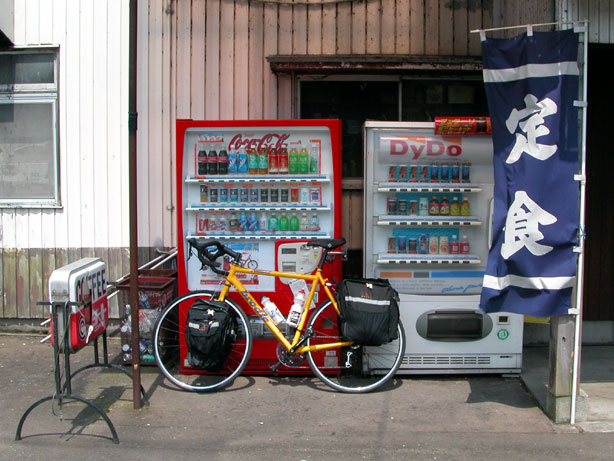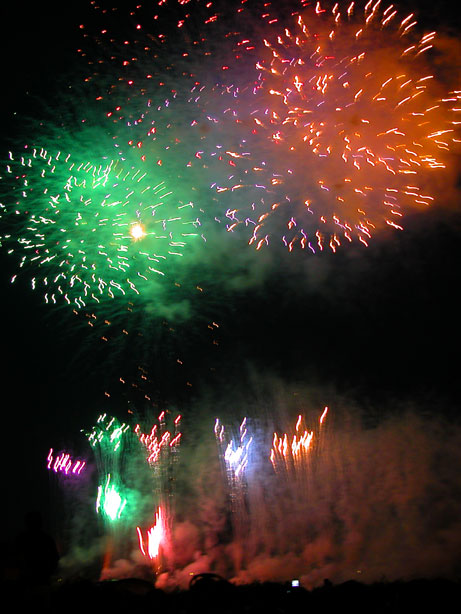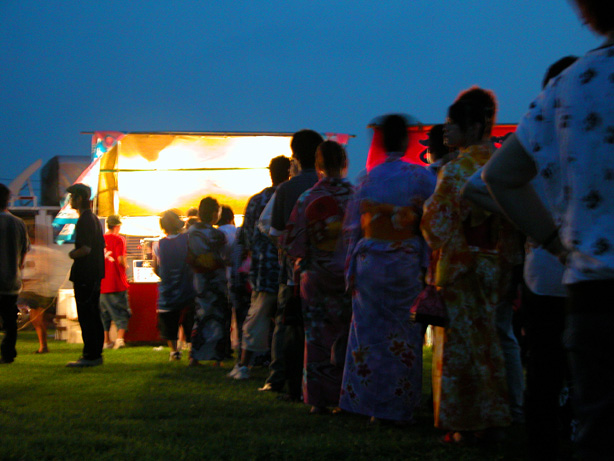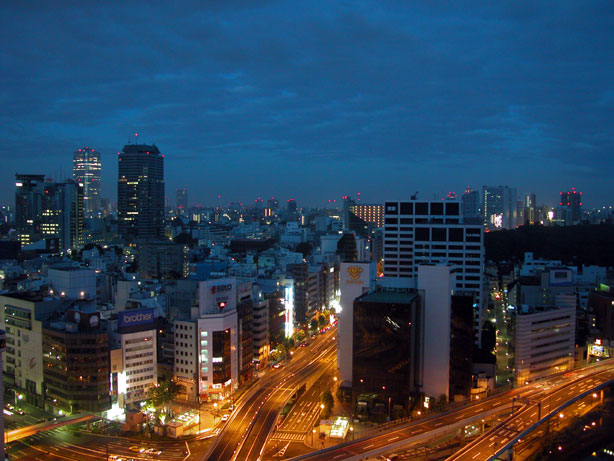Biking Japan 2003
17 August 2003
The plan was to travel from Osaka north to the Japan Sea, northeast along the coast to Joetsu, south through the alps to Nagano, then southeast all the way to Tokyo — a total distance of close to 1200 km, entirely by bicycle.
Unfortunately for me, disaster struck just over half-way, in the form of 150km/h winds and torrential downpours. Typhoon Number 10 ploughed straight through Japan, following a track from the island of Shikoku through Nagano before it died out, dumping up to 650mm of rain a day, and flooding out every town and village in its path.
I arrived in Osaka the night of July 28th and promptly hauled my bike, panniers, and tools through customs and immigration, across the airport, and into a hotel. I’m not entirely sure how happy they were to have a grotty-looking guy assembling his bike in his hotel room overnight, but no one said anything, and I snuck out around 6am anyway.
It’s unbelievable just how slowly you start and stop when your bike is loaded with 40kg of gear. Sort of the cycling equivalent of driving an 18-wheeler. The weather was a scorching 36C, with the humidity hovering around 85%. Over the first 70km from Osaka Itami Airport to downtown Kyoto, I consumed 8 litres of Dakara, Boku, Miu, and the oh-so-deliciously named Poccari Sweat, crashed twice, and got lost every 5 minutes. Took a break in Kyoto, stopping by to take a look at Sanjuusan Gendo, take some pictures, and chat with Taxi drivers, the police, and anyone else who wanted to know just what the hell I was doing.
Eventually, after a few more Poccari Sweats and some ramen for lunch, I jumped on my bike and started the trek to Otsu. Half an hour later, winding my way slowly uphill, along a narrow shoulder on a bridge 30m above a cemetary, I had the first major close call of the ride. Fortunately, through a combination of luck and skill, I deftly avoided flying over the railing and plummeting 30m to my death. Unfortunately, I did so by launching myself headlong into a traffic barrier, failing to release my toe-clips, breaking the seat right off the post, and trashing both my leg and pannier on the pavement in the process. Pretty sure my leg was broken, I lay there for a few minutes contemplating the resounding success of my bike trip thusfar while the last of the Poccari Sweat drained out of my water bottles into my shoes.

Suffice to say that the rest of the day went uphill from there (both literally and figuratively) and I arrived in Otsu, on the edge of lake Biwa, in one piece. Annie met me at the JR train station, we ditched the bike in a parking lot, and rode the train back to Kyoto, where we met up with the entire complement of Shiga JET Programme teachers at The Hub, an Irish Pub in Karamachi. After a few beers, some fish & chips and edamame, Annie and Brent hauled me back to their apartment in Imazu, where they (and I am forever indebted to them for this) put me up for three days.
Although I didn’t get to go to SummerSonic in Osaka, I did get to pick up my bike in Otsu, ride 95km back north to Imazu, and spend the evening at Imazu’s Natsu-matsuri¹ with friends of Annie’s and Brent’s (Josh, Yo, and Hatsumi). Natsu-matsuris involve many elements, but some of the most important factors are: fireworks that put ours to shame, music and dancing, traditional Yukata², and vast quantites of food and alcohol. After the festival, we dragged ourselves to Bumblebee Twist, a local bar, and had a few more before eventually hauling ourselves off to bed to recover.
The next day, we were all invited to a barbeque. The one thing that any foreigner will immediately notice about a Japanese barbeque is that you can’t just light the barbeque using zip-lights or lighter fluid. No… the correct way to light a barbeque in Japan is for one person to heat the coals with a torch while the rest stand around fanning the flames with uchiwas³ until the barbeque, in a moment of glory, bursts into flames and the cooking begins. We had music, more food, beer and Chu-hai (a sort of cider), snacks, and more fireworks. It was totally great, even though I was beat over and over at some kind of pirate game by a three-year-old.
The next morning, I said bye to Annie and Brent, then hurled myself off northwards up the highway towards the north coast. For 30km, the road winds up through the mountains over a narrow pass toward Tsuruga. In the scariest downhill of the entire ride, I plummeted down the winding road, drafting behind semi-trucks at 70km/h, flying in and out of tunnels and around hairpin turns for the 8km down into Tsuruga.
Tsuruga sits on the ocean at the edge of the Sea of Japan, at the beginning of the long road leading northeast to Fukui and Kanazawa. Unfortunately, it also sits at the beginning of a 95km-long leg of straight uphill running along the edge of a cliff with no shoulder. Fortunately, it’s some of the most beautiful riding you could possibly hope for. Even more fortunately, midway through the ride, as I sat at the side of the road huddling in a tiny corner of shade at the edge of a cliff, two motorcyclists from Osaka pulled up and offered me something to drink, a look at their road maps, and some encouragement in Kansai-dialect. This was reinforced over and over throughout my ride by children hanging out of car windows waving and shouting “ganbare!” at the top of their lungs.

Eventually, I wound my way up through the mountains to Fukui, where I almost had to spend the night camped on a park-bench by the river. Just when I’d almost given up hope of finding a hostel, someone walked up to me and in perfect English, asked if I needed a place to stay for the night. Turns out her family ran a hotel downtown, and she and her sister had spent several years living in Australia. Their mom invited me in for tea and snacks after dinner and we all stayed up late with their little boy, Ryu, yakking about travelling and good Japanese food.
The next day it was off to Kanazawa, which it turns out has a lot in common with Kyoto. While it’s much smaller, there were many beautiful old sections of town. There are temples and shrines everywhere, Kanazawa Castle and Kenrokuen — probably the most famous Japanese garden in the world. There’s also a crazy guy dressed in a cape and John Lennon glasses who runs around dragging people to convenience stores. Too embarassed not to buy an ice cream treat from the shopkeeper, I grabbed some ice-cream mochi balls, borrowed the phone and set up reservations for Nagano.
Because of the typhoon, I ended up doing the rest of the trip by train. I found a bike shop and spent the day yammering away in pseudo-Japanese to the little old grandma and grandpa who owned the shop. Turns out that he had done almost the exact same bike trip about 40 years ago! He had also cycled across Australia and much of the rest of Japan. Pretty amazing! If I hadn’t found them, my bike would probably be lying in a crumpled heap in a landfill right now. It took hours, be we did manage to pack everything into an unbelievably small bag that I could haul onto the train with me.
From Kanazawa, I caught the train to Nagano, taking local lines and limited express trains the whole way. Nagano was the site of the 1998 Winter Olympic Games, but has since reverted to its pre-Olympic small-town feel. It was a beautiful place to visit, hidden away in the Japanese alps, surrounded by Japanese hot springs and ski hills. I can’t wait to visit in winter. Nagano’s biggest feature is probably Zenkouji, a Buddhist Temple which houses the first Buddhist images to come to Japan from the Asian mainland. Underneath the temple is a pitch-black maze of tunnels that you can wander into, pushed along by wave after wave of school-children on field trips, people on pilgrimmages, and curious tourists. It’s almost impossible to tell just how fast you’re moving, or how far you’ve gone… just disembodied voices in the dark. Eventually you arrive at the “key to salvation”, which you can’t see, but you can feel. A few shakes and rattles, then you’re swept away down the tunnels again.
From Nagano, I caught the Asama Shinkansen into Tokyo. At 280km/h the trip takes just about two hours. The train tore through the edge of the hurricane at breakneck speed and we were in Tokyo on schedule to the minute. You can’t help but love the Japanese train system.

Met up with Yasuko in Tokyo, and we spent the week bumming around town and catching all the sights: Akasaka, Shinjuku, Shibuya, Odaiba, the Tsukiji fish market. Took a side trip to the art gallery a few hours away in Hakone Prefecture where a mix of European and Japanese art is on display. There were some absolutely amazing pieces of Japanese pottery in their collection. Back in Tokyo, we had the chance to see a Kabuki play. I wasn’t entirely sure what to expect, but it was great. The most striking thing is perhaps the movement. It was absolutely incredible. I wish I were able to describe it, but the best I can do is recommend that if you’re even in Tokyo, you go see a Kabuki play!
I returned home on August 17th. Ate breakfast, lunch and dinner in Tokyo, jumped on the plane at 6pm and had another breakfast and lunch. Arrived back in Canada 8 hours before I left, and had lunch and dinner again, for a total of seven meals on the 17th. Not bad! It was a pretty wild and crazy trip, but it was one of the best trips I’ve ever taken. I can’t wait to go back.
Thanks to everyone who put me up along the way! In particular, Annie & Brent, and Yasuko! You guys are the best!
Glossary
- Natsu-Matsuri: every village’s traditional summer festival, usually in early- to mid-August, near Obon, the Day of the Dead.
- Yukata: traditional light cotton kimonos that come in a variety of colours and patterns.
- Uchiwa: Large, flat traditional Japanese fan.